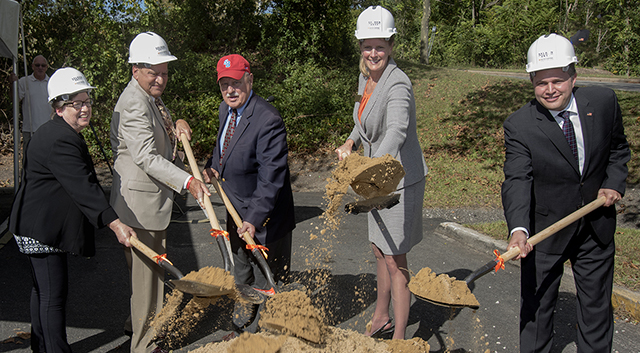October 6, 2017
SUNY Empire Breaks Ground for Sustainable, Technologically Advanced Education Facility

(SELDEN, N.Y. – Oct. 11, 2017) SUNY Empire State College broke ground yesterday for a new sustainable, technologically advanced and handicapped-accessible education facility to be located at 407 College Road, Selden, N.Y.
“All our elected officials, and especially Senator Ken LaValle, have our thanks and praise for making today’s groundbreaking a reality,” said Merodie A. Hancock, president of SUNY Empire. “Senator LaValle’s persistent determination and tireless shepherding of this project played a crucial role in making today’s groundbreaking possible. I am grateful for his steadfast support of our new building and for the SUNY Empire State College mission of statewide access, innovation and quality. Suffolk County Community College President Shaun McKay also has been a strong supporter of the college and our new building, and he, too, deserves our thanks and praise. Close proximity to Suffolk County Community college will enable even greater collaboration and stronger partnerships and transfer programs for the benefit of our Long Island students.”
Senator Ken LaValle, chairman of the state Senate Higher Education Committee, said, “The groundbreaking is a culmination of hard work over many years. I’m excited for not only the start of the construction, but for the results that will bring tomorrow’s technology here for SUNY Empire students. The state-of-the-art Immersive cloud learning will enable two-way interaction between students and faculty between campuses and expand learning opportunities. This new facility will meet critical needs for SUNY Empire students across Long Island. I am pleased to be a part of the process and look forward to the completion of the building.”
“Empire State College’s new building, and our soon-to-be new neighbor, will ensure we, as educators, are nimble and quick to respond to our region’s higher education and workforce needs,” Suffolk County Community College President Shaun L. McKay said. “The coming new structure is an investment in the economy and the future prosperity of our county and region and we look forward to future collaborations.”
“Having SUNY Empire State College here in Suffolk County, and more specifically in my legislative district, is a very welcomed addition to our community,” said Tom Muratore, who represents Suffolk County's 4th Legislative District. “Changes in lifestyle and technology have made education more accessible to non-traditional students, and I am grateful for the collaborative efforts of the SUNY Board of Trustees, Empire State College President Merodie Hancock and Senator Ken LaValle.”
“It’s important we provide an array of educational opportunities to our students," said Brookhaven Town Councilman Kevin J. LaValle. "SUNY Empire State College provides a non-traditional educational experience that will be a great fit for the residents of Suffolk County.”
About the New Facility
The two-story, 26,668-square-foot structure was designed – and will be constructed – to meet the U.S. Green Building Council’s Leadership in Energy and Environmental Design Silver standard for sustainability.
The building will include modern technology, such as Immersive Cloud Learning (ILC) source and destination rooms, technologically enhanced active learning spaces and more.
“Today’s SUNY Empire students – young and old, new and returning, traditional and nontraditional – need modern facilities, which provide greater access to faculty, technology, collaborative learning spaces and increased flexibility in terms of when, how and where they learn,” said Hancock. “Whether learning face to face or online, one to one or in mall groups, in an immersive learning cloud setting, or a blend of all modes, students require education environments that provide them with the most opportunities for success.”
ILC source and destination rooms are dedicated to delivering and receiving course content. Via the high-end Polycom camera system, Long Island-based students will be able to use ICL rooms to interact simultaneously with faculty, guest lecturers and other students who are in specially equipped ILC rooms located at the college’s Manhattan, Rochester and Staten Island locations.
Thanks to ILC technology, students can collaborate, share files, make presentations and learn from instructors in a rich learning environment in real time, at distant locations.
Sited on 6.6 acres, the state-owned facility will cost $14 million to construct. Project completion is anticipated for March 2019.
About SUNY Empire State College
Empire State College, the nontraditional, open college of the SUNY system educates nearly 18,000 students worldwide at eight international sites, more than 30 locations across the state of New York, online, as well as face to face and through a blend of both, at the undergraduate and graduate levels.
The average age of an undergraduate student at the college is 35 and graduate students’ average age is 40.
Most Empire State College students are working adults. Many are raising families and meeting civic commitments in the communities where they live, while studying part time.
In addition to awarding credit for prior college-level learning, the college pairs each undergraduate student with a faculty mentor who supports that student throughout his or her college career.
Working with their mentors, students design an individual degree program and engage in guided independent study and coursework on site, online or through a combination of both, which provides the flexibility for students to choose where, when and how to learn.
The college’s more than 80,000 alumni are active in their communities as entrepreneurs, politicians, business professionals, artists, nonprofit agency employees, teachers, veterans and active military, union members and more.
The college was first established in 1971 by the SUNY Board of Trustees with the encouragement of the late Ernest L. Boyer, chancellor of the SUNY system from 1970 to 1977. Boyer also served as United States commissioner of education during the administration of President Jimmy Carter and then as president of the Carnegie Foundation for the Advancement of Teaching.
More information about the college is available at www.esc.edu.